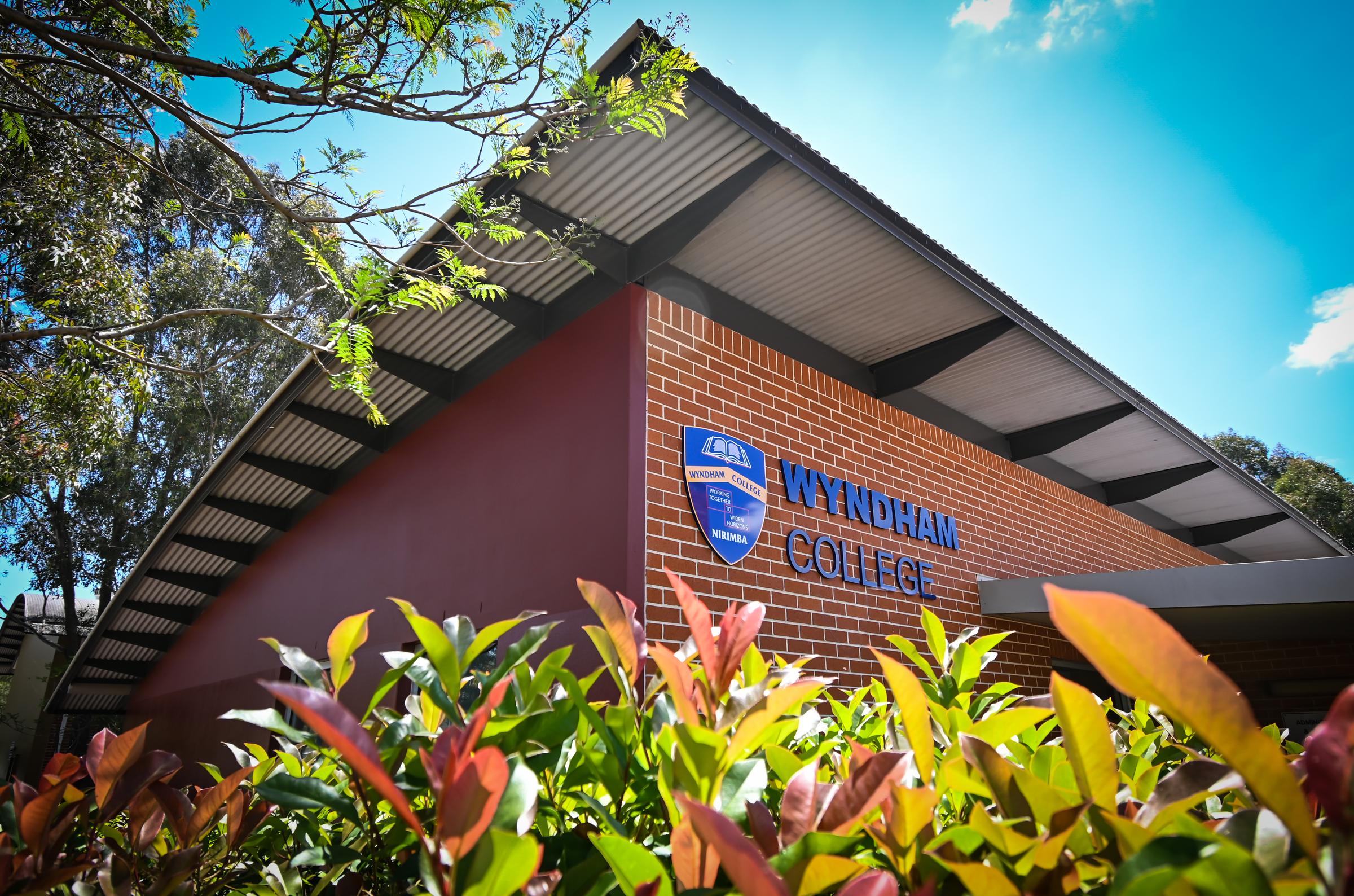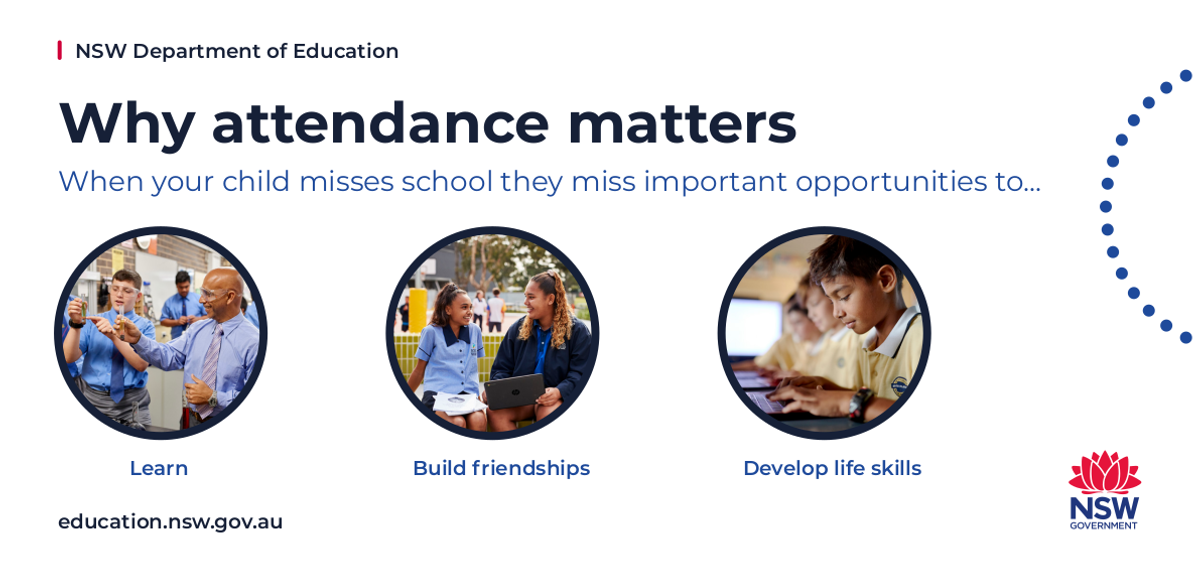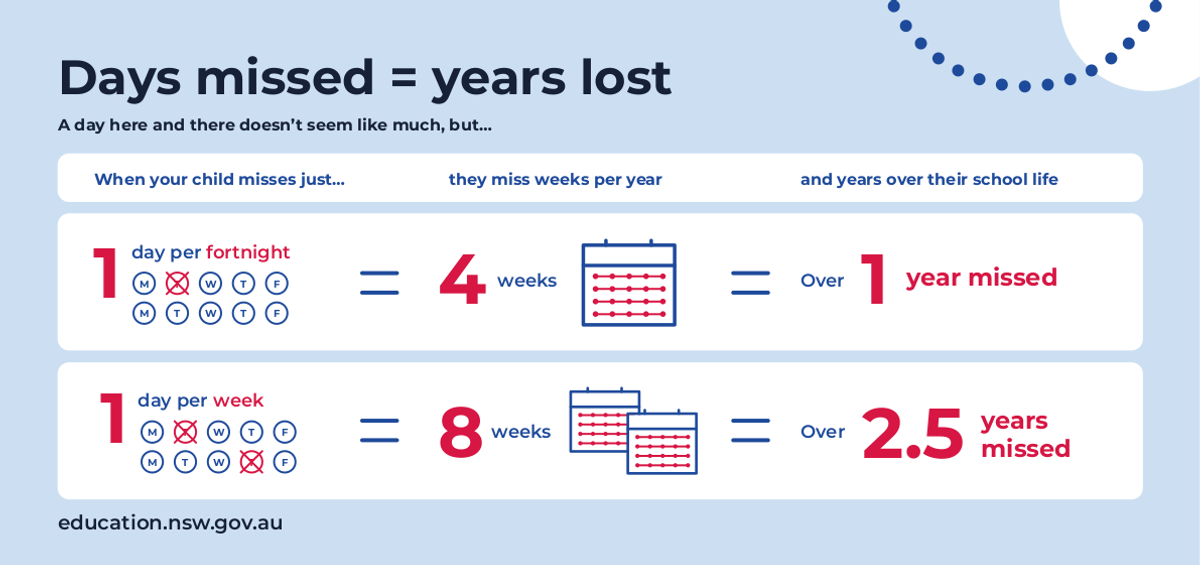COLLEGE NEWS

Every day matters, right until the last day of term.
Dear parents and carers,
We want to do all we can to be sure your child achieves their potential and enjoys being in school.
We know that school is the best place to learn. By attending school every day your child will get the most out of their learning and improve their career and life options.
When your child is absent it is important you let the school know, including the reason why, on the day or the day before. This helps make sure we know where our students are and offer support for you and your family if needed.
If you are having trouble getting your child to school every day or on time, please talk to our school staff so we can work together, because every day counts.
Missing a day here or there may not seem like much, but absences add up and can negatively impact your child’s learning and wellbeing. When your child misses one day a week that’s 40 days of school and 8 weeks of learning in one year. Over an entire school journey this adds up to 2.5 years of lost learning.
While COVID-19 and other respiratory illnesses are around especially during the winter months, schools will continue to use COVID-smart measures to minimise the risk of transmission.
If your child is unwell they will need to stay home, get tested for COVID-19 if they are experiencing symptoms and only return to school when symptom free.
Please contact the school if your child needs to miss school for any reason, so we can plan continued support for your child’s learning and wellbeing.
Dear parents, guardians and carers
Re: Nationally Consistent Collection of Data on School Students with Disability (NCCD)
Every year, all schools in Australia participate in the Nationally Consistent Collection of Data on School Students with Disability (NCCD). The NCCD process requires schools to identify information already available in the school about supports provided to students with disability. These relate to legislative requirements under the Disability Discrimination Act 1992 and the Disability Standards for Education 2005, in line with the NCCD guidelines (2019).
Information provided about students to the Australian Government for the NCCD includes:
- year of schooling
- category of disability: physical, cognitive, sensory or social/emotional
- level of adjustment provided: support provided within quality differentiated teaching practice, supplementary, substantial or extensive.
This information assists schools to:
- formally recognise the supports and adjustments provided to students with disability in schools
- consider how they can strengthen the support of students with disability in schools
- develop shared practices so that they can review their learning programs in order to improve educational outcomes for students with disability.
The NCCD provides state and federal governments with the information they need to plan more broadly for the support of students with disability.
The NCCD will have no direct impact on your child and your child will not be involved in any testing process. The school will provide data to the Australian Government in such a way that no individual student will be able to be identified – the privacy and confidentiality of all students is ensured. All information is protected by privacy laws that regulate the collection, storage and disclosure of personal information. To find out more about these matters, please refer to the Australian Government’s Privacy Policy (https://www.education.gov.au/privacy-policy).
Further information about the NCCD can be found on the NCCD Portal (https://www.nccd.edu.au).
If you have any questions about the NCCD, please contact the school.
Everyone’s NOT doing it: how schools and parents should talk about vaping.
We work at Griffith University’s Blurred Minds initiative. The program uses games to educate Australian high school students about alcohol, drugs and vaping. As part of our research, schools frequently tell us they do not have the tools and strategies to deal with the vaping crisis. In previous years, schools were most likely to seek our help for alcohol or cannabis. Now, it is for vaping.
According to a 2022 study, 32% of New South Wales teenagers aged between 14 and 17 years have tried vaping at least once. A 2017 national study found 13% of 12 to 17-year-olds had tried it.
Unfortunately, our survey research also shows vaping is common among teenagers. But it also tell us young people understand it is unsafe and unhealthy. This suggests there are genuine opportunities for schools – and parents – to intervene and help young people avoid the serious harms associated with vaping.
What is vaping and why is it so dangerous?
E-cigarettes or “vapes” are battery-powered devices that resemble metal pens, USBs, watches, or other small box-like objects. Cartridges of vape liquids or “juices” are heated and converted into vapour, which the user inhales along with harmful artificial flavourings and chemicals and other potential contaminants from the manufacturing process or the device.
A single vape can contain as much nicotine as ten packets of cigarettes.
Research shows vaping can cause lung injury, cardiovascular disease, respiratory infections, other serious, negative effects including on brain development and the immune system. Not only can vaping lead to long-term addiction, but it is also associated with other health risks such as seizures, acute nicotine toxicity and burns.
What schools tell us
There are many reasons a teenager may vape. Most commonly, curiosity or peer pressure lead to their first experience. As researchers, we have heard stories of young students trying vapes because they “taste like bubble gum”, have “colourful designs” and “smell nice”. Vapes often come in ‘sweet’ flavours and bright packaging which appeal to young people.
In 2022, we talked to almost 400 schools around Australia about their issues with vaping, alcohol and other drugs. Principals on the Gold Coast alone reported hundreds of thousands of missed school days and an increase in expulsions due to vaping.
We have heard of schools locking up toilets to avoid having a place for students to vape. But this only sees addicted students miss school to find somewhere else to vape. We also have heard from students being home schooled so they can continue to vape.
Schools know they have an important role to play in reducing the practice, but say punitive approaches are not helping students quit the habit.
What students say : our research
Last year, we surveyed 2,777 students with an average age of 14 to help understand their attitudes towards vaping, alcohol and drugs. We found:
- Vaping is common among young people. 27% of students had vaped at least once before, 37% of this group said they do it several times a day.
- But young people know it is not good for them. More than 96% said they believe vaping is unsafe (this includes 85% who said it was “totally unsafe”). More than 96% said they do not think vaping is healthy (this includes 89% who said they “totally disagreed” it was healthy).
- Students believe a lot more teenagers are vaping than there actually are. Presented with the statement, “most Australian teenagers vape,” more than 60% agreed.
- Peer pressure is a factor. Respondents said they would find it harder not to vape around friends. More than 17% said they are “unsure about their ability to resist a vape” when alone, compared to 24% when with friends.
‘I don’t want your germs’ : how to talk about vaping
Going forward there are many strategies teachers and schools can use to empower their students not to vape. These include:
- Challenging the idea “everyone is doing it”. Our research suggests young people think more people vape than actually vape. If they are concerned about fitting in, we need to give them the facts.
- Empowering young people to know they can refuse to vape. This includes ways of saying no without being singled out. Examples of what students could say include, “I don’t want to waste my money”, “I’ve seen those explode,” “I have asthma”, “I don’t want your germs,” or “Have you heard what kind of horrible things is in those?”
- Understanding the impact on their health. This will enable them to make accurate choices about their wellbeing, rather than for what they think others want from them.
- Don’t preach. Our research shows teachers are seeing much better engagement when they use tools that include games, quizzes, videos and different media elements rather than a lecture. If you are a teacher and looking for ways to engage your students, our researchers have developed free games and a free online vaping module.
Correction: the article has been updated to make it clear that of the 27% of students surveyed who had vaped before, it was 37% of this group who said they did it several times a day.
Murooj Yousef, PhD Candidate, Griffith University; James Durl, Research Fellow, Griffith University, and Timo Dietrich, Associate Professor Department of Marketing; Engagement Director Social Marketing @ Griffith, Co-founder & Director Blurred Minds, Griffith University.
This article is republished from The Conversation under a Creative Commons license.
Coming soon…..Mobile phone ban in all NSW Government Schools
Some important aspects of the ban:
- It will apply during lunch and recess, as well as in class.
- Students will still be able to carry their phones while travelling to and from school.
- School staff can allow students to use their mobile phones in specific circumstances, such as for an educational purpose, their wellbeing or to support students with specific needs.
- Individual requests to exempt a student from the ban from parents, carers, or students, should be assessed, with alternative communication options considered.
The Department of Education will be supporting schools to enact the ban.
Term 3 will be used for familiarisation and further communication with the school community, and Term 4 is scheduled for the ban to commence.




